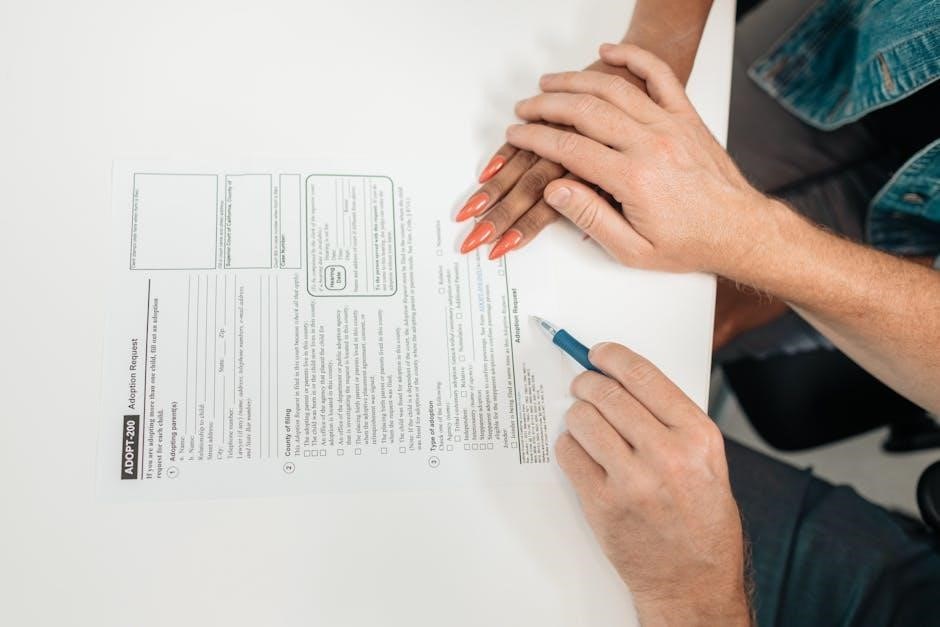
application form for sixth form
Understanding the Sixth Form Application Process
The sixth form application process involves submitting an online form, often through school websites or platforms like Applicaa, with varying deadlines and required documents for different institutions.
1.1. What is a Sixth Form Application Form?
A Sixth Form application form is a document used to apply for a place in a school or college sixth form. It typically requires personal details, academic history, and course preferences. Most forms are completed online via the institution’s website or platforms like Applicaa. Both internal students (already at the school) and external applicants must submit one. The form may include a personal statement, teacher references, and exam predictions. Deadlines vary but often fall in January.
1.2. Key Differences Between School Sixth Forms and Sixth Form Colleges
School sixth forms are part of secondary schools, offering continuity for existing students, while sixth form colleges are separate institutions. Colleges often provide broader course options, including vocational subjects, and foster greater independence. Schools may prioritize familiar environments and smaller class sizes, whereas colleges emphasize self-directed learning and diverse student communities. Both pathways prepare students for university but cater to different learning preferences and academic goals. Deadlines and admission criteria also vary between the two.
1.3. Timeline for Submitting Applications
Applications for sixth form typically open in October or September and close by January of the following year. Deadlines vary by institution, with some closing as late as January 31, 2026. Late applications may still be accepted but could limit course availability. Internal applicants often have earlier deadlines, while external applicants must submit forms by specific dates to secure a place. Checking individual school or college websites is crucial for precise timelines and requirements.

Eligibility Criteria and Requirements
Eligibility for sixth form typically requires students to be 16-17 years old, meet residency criteria, and achieve specific academic qualifications, with additional requirements for internal vs. external applicants.
2.1. Age and Residency Requirements
Applicants must be aged 16 or 17 by 31st August 2025 and be permanent UK residents. Some institutions may accept applications from students born after this date if they turn 16 during the academic year. Residency requirements vary, but most schools mandate proof of UK residency, such as a valid passport or visa. Ensure you meet these criteria before applying, as eligibility can affect your application’s success. Always check the specific institution’s rules for precise details.
2.2. Academic Qualifications Needed
Most sixth forms require students to achieve specific GCSE grades, typically a minimum of 4-5 in English and Maths. Some institutions may ask for higher grades in subjects relevant to your chosen A-Level or vocational courses. Academic qualifications vary by school, with some requiring an overall average grade. High-achieving students may also pursue the Extended Project Qualification (EPQ). Ensure your GCSE results meet the entry criteria for your desired sixth form programme to avoid eligibility issues.
2.3. Specific Requirements for Internal vs. External Applicants
Internal applicants, currently in Year 11 at the school, may follow a streamlined process, while external applicants must provide additional documents like transcripts and references. Both must meet academic criteria, but internal students may have priority. Deadlines and required documents vary, with external applicants often needing to submit forms earlier. Some institutions may require interviews or assessments for external candidates to ensure a smooth transition into their sixth form programmes.

How to Complete the Sixth Form Application Form
Access the form online, create an account, fill in personal details, choose courses, and submit before deadlines, following specific instructions from the institution.
3.1. Accessing the Application Form Online
Most sixth form application forms are available online through school websites or platforms like Applicaa. Applicants typically need to create an account, follow specific instructions, and ensure they access the correct form for their institution. Some schools may require downloading and emailing completed forms, while others offer entirely digital processes. External applicants should check the institution’s website for dedicated portals or contact the admissions team for guidance on accessing the form.
3.2. Required Documents for Submission
Applicants typically need to provide identification, proof of residency, academic transcripts, and predicted grades. Some institutions may require references from teachers or a personal statement. Ensure all documents are scanned and uploaded correctly if applying online. For external applicants, additional records, such as attendance reports, may be requested. Check the institution’s guidelines to confirm specific requirements and avoid delays in processing your application.
3.3. Step-by-Step Guide to Filling Out the Form
Access the application form online via the institution’s website or platform like Applicaa. Create an account if required, then fill in personal details, academic history, and course preferences. Upload necessary documents, such as ID, transcripts, and references. Review all information for accuracy before submission. Ensure the form is completed by the specified deadline to avoid delays in processing. Double-check for any additional requirements specific to the institution.

Choosing Your Courses
Students must select A-Level or vocational courses, considering career goals and academic strengths. Many institutions offer guidance to help choose the right subjects for future success.
4.1. Overview of A-Level and Vocational Course Options
Students can choose between A-Level subjects, vocational courses like BTECs, or a mix of both. A-Levels are traditional qualifications focused on academic disciplines, while vocational courses emphasize practical skills. Many institutions also offer the Extended Project Qualification (EPQ) to enhance academic portfolios. Course combinations vary, allowing students to tailor their studies to career goals or university requirements, with some opting for up to four A-Level subjects if deemed suitable.
4.2. How Course Choices Impact Your Application
Course selections significantly influence your sixth form application, as they reflect your academic strengths and future ambitions. Choosing A-Levels aligns with university aspirations, while vocational courses prepare for specific careers. Institutions assess how well your choices match their offerings and your potential to succeed. Aligning your options with career goals strengthens your application, demonstrating clarity and purpose. Some students may pursue four A-Levels if academically capable, showcasing exceptional ability.
4.3. Advice on Selecting the Right Combination
When selecting courses, balance academic strengths with future career goals. Consider A-Levels for university pathways and vocational options for practical skills. Seek advice from teachers to ensure choices align with abilities. Avoid overloading with too many subjects unless confident in managing the workload. Mix traditional A-Levels with EPQ for broader development. Ensure selections meet university entry requirements, demonstrating a clear academic or vocational direction. This strategy enhances both success and satisfaction in sixth form studies.

Tips for Submitting a Strong Application
A strong application requires a compelling personal statement, strong teacher references, and careful attention to detail to avoid common mistakes, ensuring a competitive submission for sixth form placement.
5.1. Writing a Compelling Personal Statement
A personal statement is crucial for showcasing your academic strengths, extracurricular achievements, and future aspirations. Highlight why you are passionate about your chosen subjects and how they align with your career goals. Be specific about your accomplishments and demonstrate self-reflection. Keep your tone professional yet sincere, ensuring your unique voice shines through. Admissions officers want to see clarity, enthusiasm, and a genuine commitment to your studies. Avoid generic statements and focus on what makes you stand out.
5.2. Securing Strong Teacher References
To strengthen your application, request references from teachers who know your academic strengths well. Provide them with details about your chosen courses and career goals to help them craft a tailored reference. Ensure they understand the submission deadlines and requirements. A well-written reference highlighting your achievements and potential can significantly enhance your application, demonstrating your suitability for Sixth Form study and future success.
5.3. Avoiding Common Mistakes
Avoid missing deadlines, as late submissions may not be accepted. Ensure all sections of the form are completed fully and accurately. Proofread your personal statement and references for errors. Double-check subject choices and institution details. Submitting early allows time to address any issues. Seek feedback from teachers or mentors to improve your application. Avoid generic statements and ensure your application reflects your true potential and aspirations.

Understanding Sixth Form Admissions at Different Institutions
Admissions processes vary significantly across school sixth forms, sixth form colleges, and independent schools, each with unique criteria, deadlines, and requirements for applicants.
6.1. School Sixth Forms vs. Further Education Colleges
School sixth forms and further education colleges offer distinct environments for post-16 education. School sixth forms provide continuity for students staying at their current school, often with smaller class sizes and a familiar support system. In contrast, further education colleges, like sixth form colleges, cater to a broader range of students, offering more flexible course options and a taste of independence. Each option suits different student preferences and academic goals, allowing tailored choices for future pathways.
6.2. Specialized Sixth Form Colleges
Specialized sixth form colleges focus on specific academic or vocational areas, such as STEM, arts, or technical skills. These institutions often provide tailored courses, expert instructors, and state-of-the-art facilities to nurture student interests. They may offer unique programs like vocational diplomas or specialized A-Level combinations, catering to students with clear career goals. Admission requirements can vary, emphasizing relevant subject strengths or portfolio submissions, ensuring a focused learning environment for ambitious students.
6.3. Independent Schools and Their Admissions Processes
Independent schools often have distinct admission processes for sixth form entry, emphasizing academic excellence and extracurricular potential. Applicants may need to submit a detailed personal statement, attend interviews with senior staff, and provide strong teacher references. Some schools may require entrance exams or portfolios, depending on the program. Deadlines and requirements can vary widely, so early research and preparation are crucial to navigate these competitive processes effectively.

Next Steps After Submitting Your Application
After submitting your application, await confirmation and follow up on any additional steps like interviews or assessments. Track your application status through the provided portal or contact the institution directly.
7.1. What Happens After You Apply?
After submitting your sixth form application, you will typically receive a confirmation email. Institutions then review applications, often conducting interviews or assessments. Processing times vary, but most aim to notify applicants within a few weeks. Some colleges, like Westminster Academy, provide online portals to track application status. Others, such as Camden School, may require direct contact. Be patient and follow up if you encounter delays or issues.
7;2. Interview Process and Assessments
After submitting your application, many sixth form institutions conduct interviews or assessments to evaluate your suitability. These may include panel interviews or one-on-one discussions. Some colleges also administer aptitude tests, particularly for competitive subjects. Prepare by researching the institution and practicing responses to common questions. Dress professionally and showcase enthusiasm for your chosen courses. Assessments aim to gauge your academic potential and alignment with the sixth form’s values and expectations.
7.3. Receiving an Offer and Confirming Your Place
Upon receiving an offer, carefully review the terms and confirm your place by the specified deadline. Ensure all required documents are submitted, and review subject allocations. Some institutions may require an online confirmation or a signed acceptance form. Meeting deadlines is crucial to secure your spot and preferred course combinations. Follow the institution’s instructions precisely to finalize your enrollment for the upcoming academic year.